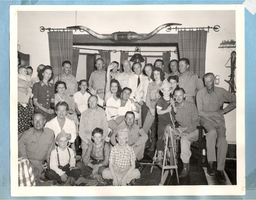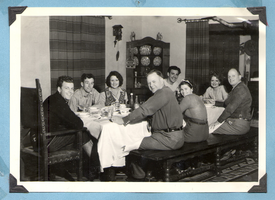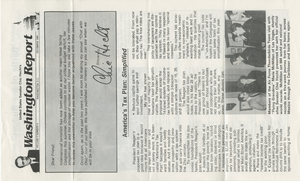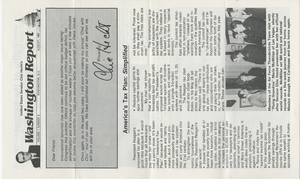Search the Special Collections and Archives Portal
Search Results

Group of servicemen (for General Patton) at a party at Walking Box Ranch, Nevada: photographic print
Date
Archival Collection
Description
Bell Family Scrapbook scanning, Set 4, proofed 11.04.2010 Photograph taken when General Patton's troops visited Walking Box Ranch. Photo was taken in the great room of the ranch house. Rex Anthony Bell, Jr (Toni Larbow Beldam) is seated on the floor in the center with a military cap and checkered shirt. George Francis Robert Bell is seated on a wooden 'horse' holding a rope and also wearing a military cap. Clara is seated in the center on an unidentified man's lap with her arm raised. Rex Bell (George Francis Beldam) is located behind Clara's outstretched arm and hand in the back
Image

Group of people seated at the dining table in the ranch house at Walking Box, Ranch: Nevada: photographic print
Date
Archival Collection
Description
Bell Family Scrapbook scanning, Set 4, proofed 11.04.2010 Group of people seated at the dining table in the ranch house. From left clockwise around the table; Rex Bell, his brother Hodson Beldam, Marion Lewyn, Lon Chaney, Clara Bow, Louis Lewyn, Hodson Beldam's wife Kathy, Hod Bed Clara and Rex Bell (George Francis Beldam)at either ends of the table. Dinner Party at the ranch. Rex on left, his brother Hodson Beldam and his wife Kathy, then Lon Chaney, Clara, Henry Lewin (producer from Hollywood) and his wife Marian
Image

Floyd Jenne interview, April 4, 1976: transcript
Date
Archival Collection
Description
From the Ralph Roske Oral History Project on Early Las Vegas; OH-00944. On April 4, 1976, Gordon Brusso interviewed Floyd L. Jenne (born 1915). The interview discussed Boulder City McGill, as well as Nevada history.
Text

Transcript of interview with James Bonnell by Gerald L. Conner, February 22, 1977
Date
Archival Collection
Description
On February 22, 1977, James Bonnell interviewed Gerald L. Connor (born 1930 in Boston, Massachusetts) about his experiences in Nevada and his work in education. Connor first talks about his move to Nevada while he was a member of the United States Air Force. He then discusses his education, including that at the University of Nevada, Las Vegas, and also describes his church membership. Connor later talks about changes in the schools and school district, the growth of gambling and properties located in Downtown Las Vegas and the Las Vegas Strip, and the early atomic tests at the Nevada Test Site. He also describes in detail his political activity and involvement with the Democratic Party, including his work with candidates for the offices of Nevada Governor and United States Senator. Towards the end of the interview, Connor talks about events such as Helldorado, the growth of the city over time, and his thoughts on the future of Las Vegas.
Text

Transcript of interview with Russell Grater by Frederick Dougan, February 10, 1977
Date
Archival Collection
Description
On February 10, 1977, Frederick Dougan interviewed Russell Grater (born 1907 in Lebanon, Indiana) about his career in the U.S. National Park Service. Grater first talks about his move to the Southern Nevada area and his work that impacted the Hoover Dam project. He then talks about the town of St. Thomas, Nevada, the Lost City, and the activities of tourists. Grater also talks about his work in excavation, the indigenous American Indian tribes of the area, findings on petroglyphs, and the types of wildlife that were found in the area. He later talks about findings related to fossils, gold mining, the effects of World War II on the dam project, and vegetation in the area.
Text

Howard Heckethorn interview, February 15, 1979: transcript
Date
Archival Collection
Description
On February 15, 1979, collector Richard Eitland interviewed Howard Heckethorn (born September 14th, 1922 in St. George, Utah) at Red Rock Elementary School in Las Vegas, Nevada. Mr. Heckethorn discusses going to school in the early days of Las Vegas, Nevada. He also talks about many notable teachers he had, as well as the development of the Las Vegas area.
Text

Transcript of interview with Ed Fleming by Mark Lucas, February 8, 1977
Date
Archival Collection
Description
On February 8, 1977, Mark Lucas interviewed Edmund “Ed” Fleming (born 1915 in Virginia, Minnesota) about his experience in Southern Nevada. Fleming first talks about his moves to and from Nevada before describing the mining practices within the small towns in Southern Nevada. He also talks about his experience as a teacher in Pahrump and Goodsprings and his eventual move to Las Vegas, where he continued in the educational field. Fleming also talks about religion, transportation, funding for education, inflation, and cultural arts as they all relate to Las Vegas.
Text

Transcript of interview with Bruce L. Woodbury by Stefani Evans, September 27, 2016
Date
Archival Collection
Description
As Bruce Woodbury reflects on his twenty-eight years as Clark County's longest-serving County commissioner (1981–2009) he recalls serving with about thirty different commissioners. Surprisingly, "only seven of us got major jail sentences." He ruminates how Federal Bureau of Investigation probes Operation Yobo in the early 1980s and G Sting in the early 2000s exposed several Clark County politicians who succumbed to greed. While Woodbury considers honesty in office a given, his values were not held by all of his colleagues. One Operation Yobo recording caught a fellow commissioner responding to the query, "How about Woodbury?" with, "No, you can't touch him with a ten foot pole." Woodbury remembers his "campaign guys really liked that." Apparently the voters did as well, as he consistently won re-election. The Las Vegas native, who was raised in the John S. Park neighborhood and attended Las Vegas schools, earned his Bachelor's degree at the University of Utah and his Juris Doctorat
Text


